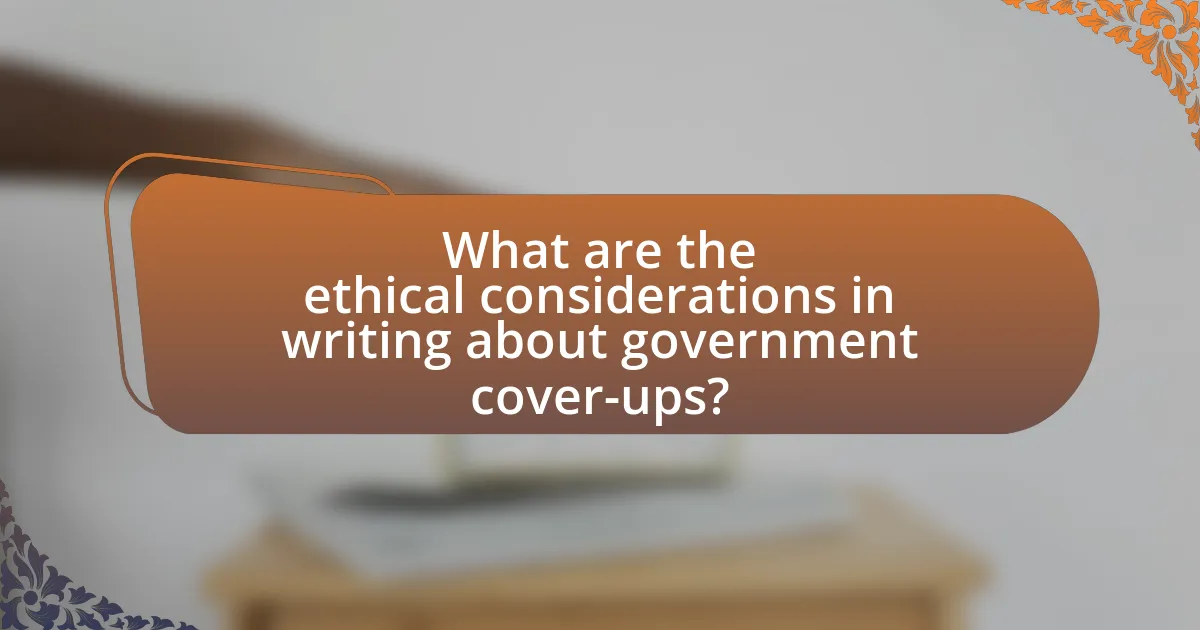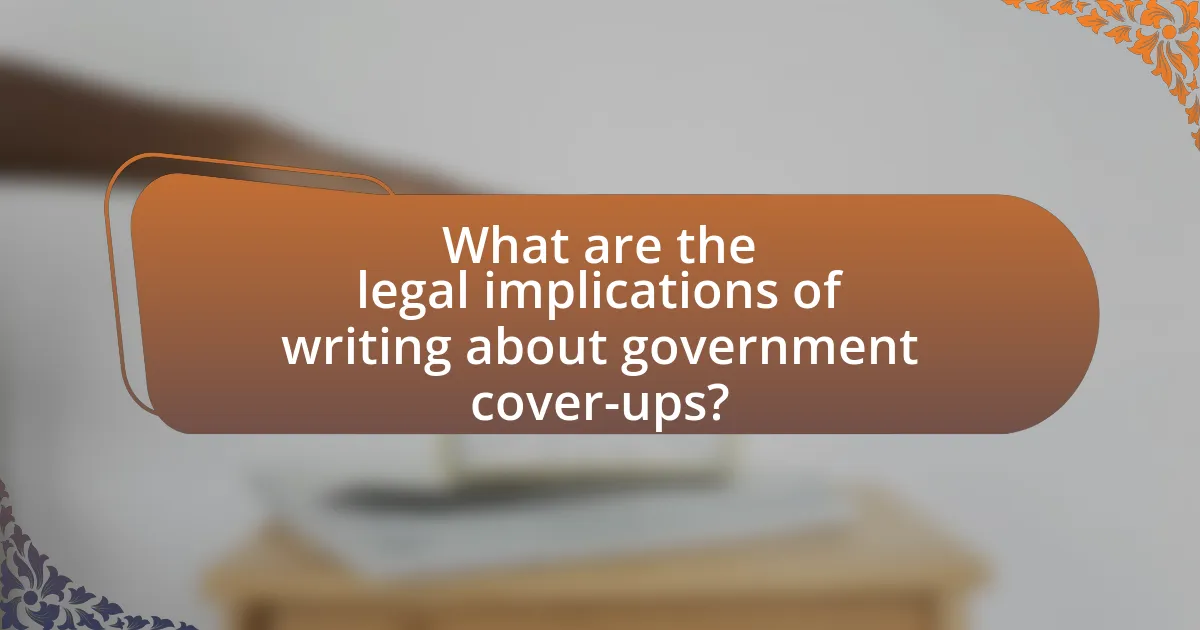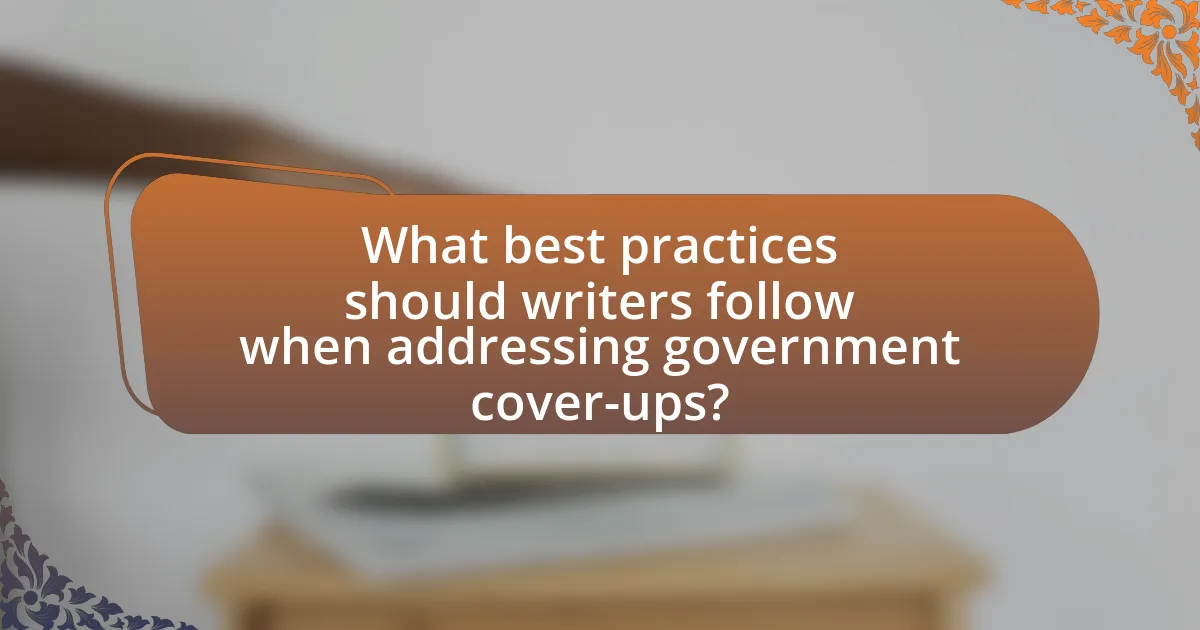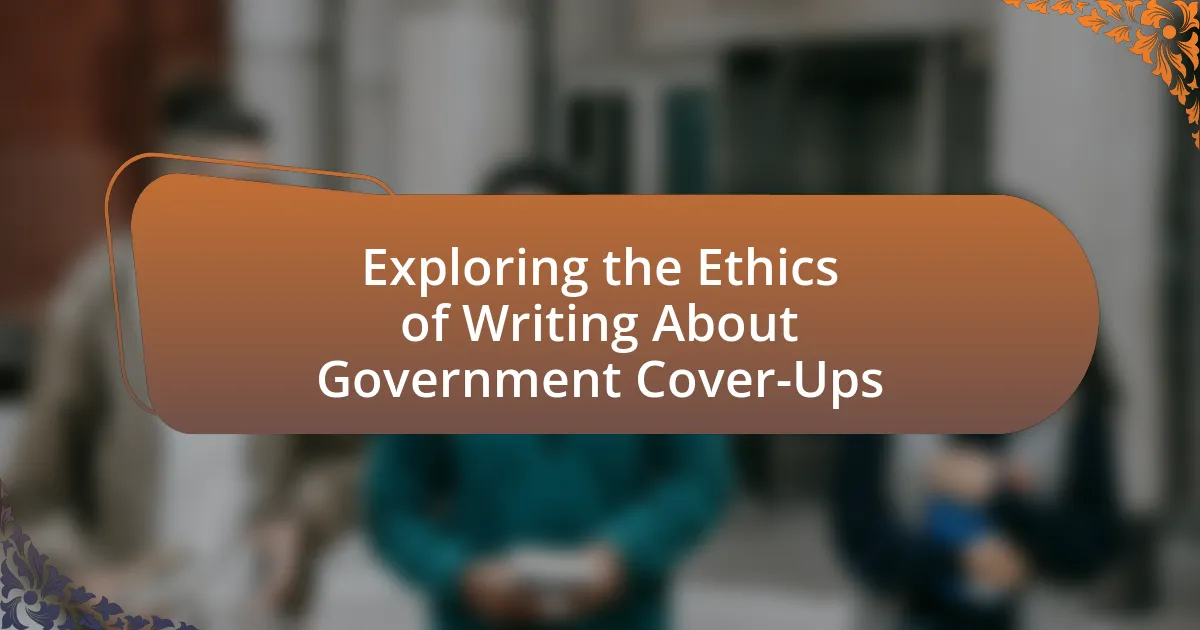The article “Exploring the Ethics of Writing About Government Cover-Ups” examines the complex ethical considerations that writers face when addressing government concealment of information. It highlights the importance of accuracy, the potential impact on public trust, and the balance between transparency and national security. Key topics include the role of investigative journalism in promoting accountability, the legal implications of exposing cover-ups, and best practices for ethical reporting. The article emphasizes the necessity of thorough research, fact-checking, and audience engagement to uphold journalistic integrity while navigating the challenges associated with sensitive information.

What are the ethical considerations in writing about government cover-ups?
The ethical considerations in writing about government cover-ups include the responsibility to ensure accuracy, the potential impact on public trust, and the need to balance transparency with national security. Writers must verify facts to avoid spreading misinformation, as inaccuracies can lead to public panic or misinterpretation of events. Additionally, exposing cover-ups can erode trust in government institutions, which is crucial for a functioning democracy. Furthermore, journalists must consider the implications of revealing sensitive information that could compromise national security or endanger individuals involved. These considerations highlight the complex ethical landscape that writers navigate when addressing government cover-ups.
Why is it important to address government cover-ups in writing?
Addressing government cover-ups in writing is crucial for promoting transparency and accountability. When writers expose these cover-ups, they provide the public with essential information that can influence democratic processes and uphold the rule of law. Historical examples, such as the Watergate scandal, demonstrate how investigative journalism can lead to significant political reforms and restore public trust in government institutions. By documenting and analyzing these events, writers contribute to a more informed citizenry, which is vital for a functioning democracy.
What impact do government cover-ups have on public trust?
Government cover-ups significantly erode public trust. When citizens discover that their government has concealed information, it leads to skepticism about the integrity and transparency of governmental institutions. For instance, the Watergate scandal in the 1970s resulted in a dramatic decline in public confidence in the U.S. government, with trust levels dropping from 77% in 1964 to 36% by 1974, according to a Gallup poll. This historical example illustrates how revelations of cover-ups can create lasting damage to the relationship between the government and its citizens, fostering a culture of distrust that can persist for generations.
How can writing about cover-ups influence public perception?
Writing about cover-ups can significantly influence public perception by revealing hidden truths and fostering skepticism towards authorities. When journalists or authors expose government cover-ups, they provide evidence that can challenge official narratives, leading the public to question the integrity and transparency of those in power. For instance, the Watergate scandal, uncovered by journalists Bob Woodward and Carl Bernstein, shifted public trust in the U.S. government and highlighted the importance of investigative journalism in holding officials accountable. This exposure not only informs citizens but also mobilizes them to demand accountability, thereby reshaping societal attitudes towards governance and authority.
What ethical dilemmas do writers face when discussing cover-ups?
Writers face significant ethical dilemmas when discussing cover-ups, primarily concerning the balance between public interest and potential harm. The challenge lies in determining whether revealing sensitive information serves the greater good or endangers individuals involved, including whistleblowers and innocent parties. For instance, the publication of classified documents can expose government malfeasance but may also compromise national security or personal safety. Additionally, writers must navigate the ethical implications of sourcing information, ensuring that their reporting does not rely on unverified claims that could mislead the public or damage reputations unjustly. These dilemmas highlight the complex responsibilities writers hold in maintaining journalistic integrity while advocating for transparency.
How do confidentiality and whistleblower protections affect reporting?
Confidentiality and whistleblower protections significantly enhance reporting by providing a secure environment for individuals to disclose wrongdoing without fear of retaliation. These protections encourage more people to come forward with information about unethical or illegal activities, as they know their identities will be safeguarded. For instance, the Whistleblower Protection Act in the United States offers legal safeguards to whistleblowers, which has led to increased reporting of fraud and misconduct in government and private sectors. Studies indicate that organizations with strong whistleblower protections see a higher rate of reporting, which ultimately contributes to greater accountability and transparency in governance.
What are the potential consequences for writers exposing cover-ups?
Writers exposing cover-ups may face severe consequences, including legal repercussions, professional backlash, and personal safety risks. Legal repercussions can manifest as lawsuits for defamation or breach of confidentiality, as seen in cases like the Pentagon Papers, where whistleblowers faced significant legal challenges. Professional backlash may involve loss of employment or damage to reputation, as organizations may distance themselves from writers who challenge powerful entities. Additionally, personal safety risks can arise, with instances of intimidation or threats reported against journalists who uncover sensitive information, highlighting the dangers associated with investigative reporting.
How can writers balance truth and responsibility in their narratives?
Writers can balance truth and responsibility in their narratives by adhering to ethical guidelines that prioritize accuracy while considering the potential impact of their work. This involves thorough research to ensure factual integrity, as seen in investigative journalism, where reporters verify claims through multiple credible sources before publication. Additionally, writers should evaluate the consequences of revealing sensitive information, particularly in cases involving government cover-ups, where the disclosure may affect national security or individual safety. For instance, the Pentagon Papers case illustrates the tension between public interest and governmental secrecy, highlighting the need for responsible reporting that weighs the benefits of transparency against potential harm. By maintaining this balance, writers can contribute to informed public discourse while upholding their ethical obligations.
What role does fact-checking play in ethical writing about cover-ups?
Fact-checking is essential in ethical writing about cover-ups as it ensures the accuracy and credibility of the information presented. By rigorously verifying facts, writers can prevent the dissemination of misinformation that could mislead the public or damage reputations. For instance, investigative journalism that uncovers government cover-ups relies heavily on fact-checking to substantiate claims, as seen in the Watergate scandal, where meticulous verification of sources and documents led to significant political accountability. Thus, fact-checking not only upholds journalistic integrity but also fosters trust between the writer and the audience.
How can writers ensure they represent all sides of the story?
Writers can ensure they represent all sides of the story by conducting thorough research and including diverse perspectives. This involves interviewing multiple stakeholders, such as government officials, affected citizens, and experts in relevant fields, to gather a comprehensive understanding of the issue. For instance, in cases of government cover-ups, examining documents, public records, and previous investigative reports can provide additional context and viewpoints. By presenting facts from various sources, writers can create a balanced narrative that reflects the complexity of the situation, thereby enhancing the credibility and ethical integrity of their work.

What are the legal implications of writing about government cover-ups?
Writing about government cover-ups can lead to legal implications such as defamation, breach of confidentiality, and potential violations of national security laws. Defamation occurs if the information published is false and harms the reputation of individuals or entities, which can result in lawsuits. Breach of confidentiality may arise if the writer discloses classified or sensitive information without authorization, leading to legal action from the government. Additionally, national security laws, such as the Espionage Act, can impose severe penalties for unauthorized disclosure of information that could harm national interests. These legal frameworks underscore the risks involved in exposing government cover-ups, emphasizing the need for careful consideration and legal counsel when addressing such topics.
What laws protect journalists when reporting on cover-ups?
Laws that protect journalists when reporting on cover-ups include the First Amendment of the U.S. Constitution, which guarantees freedom of speech and press, allowing journalists to investigate and report on government misconduct without fear of censorship or retaliation. Additionally, various state shield laws protect journalists from being compelled to disclose confidential sources or unpublished information in legal proceedings, thereby encouraging whistleblowers to come forward with information about cover-ups. For instance, the California Shield Law provides strong protections for journalists, allowing them to refuse to testify about their sources. These legal frameworks are essential for maintaining a free press and ensuring accountability in government actions.
How do freedom of information laws impact cover-up investigations?
Freedom of information laws significantly enhance cover-up investigations by providing the public and journalists access to government documents and records that may reveal misconduct or hidden information. These laws empower individuals to request information that can expose attempts to conceal wrongdoing, thereby promoting transparency and accountability. For instance, the Freedom of Information Act (FOIA) in the United States has been instrumental in uncovering various scandals, such as the Watergate scandal, where documents obtained through FOIA requests played a crucial role in revealing the extent of the cover-up. This access to information can lead to public scrutiny, legal challenges, and ultimately, reforms aimed at preventing future cover-ups.
What legal risks do writers face when disclosing sensitive information?
Writers face significant legal risks when disclosing sensitive information, including potential defamation, invasion of privacy, and breach of confidentiality. Defamation occurs if the disclosed information falsely harms the reputation of individuals or organizations, leading to lawsuits. Invasion of privacy can arise if writers reveal private facts about individuals without consent, which may violate privacy laws. Breach of confidentiality is a risk when writers disclose information that was shared in a confidential context, potentially resulting in legal action from the disclosing party. These risks underscore the importance of understanding legal boundaries and ethical considerations in writing about sensitive topics, particularly in the context of government cover-ups.
How can writers navigate potential legal challenges?
Writers can navigate potential legal challenges by conducting thorough research and understanding the laws related to defamation, copyright, and privacy. This involves familiarizing themselves with the legal definitions and implications of these areas, as well as reviewing relevant case law that illustrates how courts have ruled in similar situations. For instance, the landmark case of New York Times Co. v. Sullivan established the “actual malice” standard for public figures, which writers must consider when discussing government actions. Additionally, obtaining legal advice before publication can help identify potential risks and ensure compliance with applicable laws, thereby reducing the likelihood of legal repercussions.
What steps can be taken to minimize legal repercussions?
To minimize legal repercussions when writing about government cover-ups, individuals should conduct thorough research to ensure accuracy and credibility. This includes verifying facts through multiple reliable sources, which helps to establish a solid foundation for claims made in the writing. Additionally, obtaining legal advice before publication can provide guidance on potential risks and help navigate complex legal frameworks, such as defamation and privacy laws. Furthermore, employing careful language that avoids unsubstantiated allegations can reduce the likelihood of legal challenges. These steps are supported by the fact that many successful whistleblowers and investigative journalists have utilized similar strategies to protect themselves legally while exposing wrongdoing.
How can legal counsel assist in the writing process?
Legal counsel can assist in the writing process by providing guidance on compliance with laws and regulations relevant to the content being produced. This includes ensuring that the writing does not violate defamation laws, copyright issues, or confidentiality agreements, which are particularly important when discussing sensitive topics like government cover-ups. Legal experts can also help in drafting disclaimers and ensuring that the language used is precise to avoid potential legal repercussions. Their expertise is crucial in navigating the complex legal landscape surrounding such topics, thereby protecting the writer from legal liabilities.

What best practices should writers follow when addressing government cover-ups?
Writers addressing government cover-ups should prioritize thorough research, fact-checking, and ethical considerations. Conducting comprehensive investigations into the claims and evidence surrounding the cover-up is essential, as demonstrated by the Watergate scandal, where investigative journalism revealed significant government misconduct. Writers must also ensure the accuracy of their sources, utilizing credible documents, eyewitness accounts, and expert opinions to substantiate their claims. Furthermore, maintaining transparency about potential biases and conflicts of interest enhances credibility. Ethical considerations, such as respecting privacy and avoiding sensationalism, are crucial to uphold journalistic integrity while informing the public about government actions.
How can writers effectively research government cover-ups?
Writers can effectively research government cover-ups by utilizing a combination of primary and secondary sources, including declassified documents, whistleblower testimonies, and investigative journalism. Accessing archives such as the National Security Archive or Freedom of Information Act requests can yield valuable information that is not readily available to the public. Additionally, analyzing historical case studies, such as the Watergate scandal or the Iran-Contra affair, provides context and insight into the methods used to conceal information. Engaging with experts in political science or history can also enhance understanding and provide credible perspectives on the implications of these cover-ups.
What sources are most reliable for uncovering cover-up information?
Investigative journalism is the most reliable source for uncovering cover-up information. Investigative journalists often utilize primary documents, whistleblower testimonies, and expert interviews to expose hidden truths. For instance, the Watergate scandal was uncovered by journalists Bob Woodward and Carl Bernstein, who relied on confidential sources and meticulous research to reveal government misconduct. Additionally, reputable organizations like ProPublica and the Center for Investigative Reporting specialize in in-depth investigations, providing credible insights into potential cover-ups. These sources are validated by their track record of exposing significant issues and holding powerful entities accountable.
How can writers verify the authenticity of their sources?
Writers can verify the authenticity of their sources by cross-referencing information with multiple credible publications and databases. This method ensures that the data is corroborated by independent sources, which enhances its reliability. For instance, using academic journals, government reports, and reputable news organizations can provide a solid foundation for verifying claims. Additionally, checking the credentials and expertise of the source can further establish authenticity; sources with established reputations in their fields are more likely to provide accurate information.
What strategies can enhance the ethical reporting of cover-ups?
Enhancing the ethical reporting of cover-ups can be achieved through several strategies, including rigorous fact-checking, transparency in sourcing, and adherence to journalistic integrity. Rigorous fact-checking ensures that all claims are substantiated with credible evidence, reducing the risk of misinformation. Transparency in sourcing involves clearly identifying the origins of information, which builds trust with the audience and allows for independent verification. Adhering to journalistic integrity means following ethical guidelines, such as avoiding conflicts of interest and prioritizing the public’s right to know over sensationalism. These strategies collectively foster accountability and credibility in reporting on sensitive issues like government cover-ups.
How can transparency in the writing process build credibility?
Transparency in the writing process builds credibility by allowing readers to understand the sources, methods, and motivations behind the content. When writers disclose their research methods and the origins of their information, it fosters trust, as readers can verify claims and assess the reliability of the data presented. For instance, a study published in the Journal of Business Ethics found that transparency in communication significantly enhances perceived credibility among audiences. This demonstrates that clear and open writing practices not only support ethical standards but also reinforce the author’s authority and trustworthiness in discussing sensitive topics like government cover-ups.
What role does audience engagement play in ethical writing?
Audience engagement is crucial in ethical writing as it fosters transparency and accountability. Engaging the audience allows writers to present information in a way that resonates with readers, ensuring that complex issues, such as government cover-ups, are communicated effectively. This engagement encourages dialogue, enabling writers to address concerns and misconceptions, which is essential for maintaining ethical standards. Research indicates that ethical writing practices, particularly in sensitive topics, benefit from audience feedback, as it helps writers refine their messages and uphold integrity.
What practical tips can writers use to approach government cover-ups ethically?
Writers can approach government cover-ups ethically by prioritizing accuracy, transparency, and accountability in their research and reporting. Ensuring that information is verified through multiple credible sources helps maintain factual integrity, as demonstrated by investigative journalism standards upheld by organizations like the Society of Professional Journalists. Additionally, writers should disclose potential conflicts of interest and avoid sensationalism, which can distort the truth and mislead the public. Engaging with legal experts to understand the implications of publishing sensitive information further supports ethical practices, as seen in cases where journalists have navigated legal challenges while exposing government misconduct.
